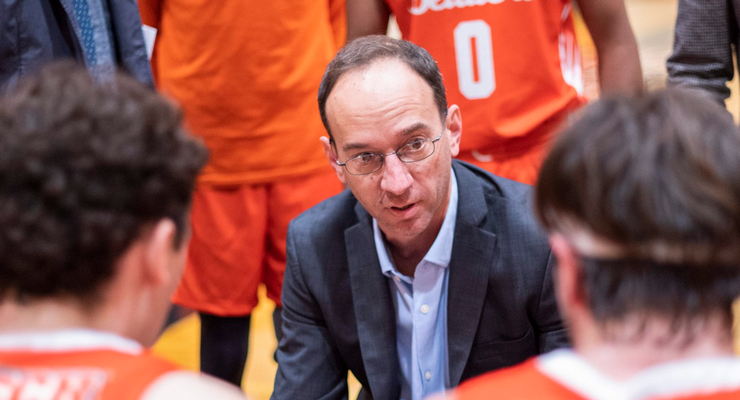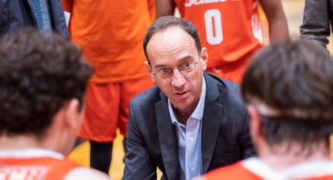
Marcus Gee (BS ’22) made a shot for the ages. When the then-junior guard sank a buzzer-beating three-pointer to win at Occidental College on February 25, 2020, he simultaneously set the Caltech men’s basketball record for points in a season and assured the Beavers their first in-conference winning season since 1954.
That same season secured Coach Oliver Eslinger and his colleagues the Southern California Intercollegiate Athletic Conference (SCIAC) 2020 Coaching Staff of the Year Award. And it delivered on the promise Eslinger had brought to Caltech more than a dozen years earlier, one that continues to be his focus. “I came in with a vision that we’re at the greatest institute in the world,” Eslinger said. “It’s all about excellence, so let’s make it all about excellence in the athletic arena as well.”
And then, a few weeks after the fateful shot and the accompanying eruption of cheers, the gym lights went dark.
“Everything just stopped,” Eslinger says. When the COVID-19 pandemic arrived, “we didn’t even get to have our team banquet. We didn’t really get to celebrate what we did in 2020.” The 2020–21 basketball season had to be canceled, leaving the coach and his players searching for ways to stay connected to the game. Eslinger found it by going back to basics. He spent the year diving into books, taking care of his three children, and trying to become an even better coach, often by attending or speaking at coaching clinics over Zoom. Listening to great coaches, especially those who think deeply about teaching philosophies, allowed him to reassess his own approaches, he says.
“If you go in and just say to players, ‘Here, do it this way because this is how I was taught,’ there’s just going to be a lot of resistance,” Eslinger says. “By asking questions, listening, watching, and studying, I learn a lot more. And then can ask questions like, ‘How did you make this decision to make that pass?’ Then you start to have a conversation about it, and you can develop a dialogue instead of just being the conductor in front of the whole orchestra.”
Study of the game and the philosophy of coaching is nothing new for the Eslinger, who has had hoops on his mind since his boyhood days in Broken Arrow, Oklahoma. Before the days of nightly NBA broadcasts on TV and highlights on YouTube, he would record games on VHS tapes and rewatch them to learn the strategy of the game. In high school, he began diagramming plays; by college at Clark University in Worcester, Massachusetts, his interest had turned to coaching, a path that led him to become associate head coach at MIT.
Eslinger came to Pasadena during challenging times, as the Beavers were decades removed from their last win in a conference game. The coach based his basketball philosophy on the idea of “embracing the challenge” of turning Caltech into a contender on the court. The program has steadily improved over the coach’s tenure as he introduced the season-opening “midnight madness” common at college basketball powerhouses and inaugurated the “110 Rivalry” with the Beavers’ rival down the freeway, Occidental.
“Our students, they work so hard in the classroom, and they really are perfectionists; they’re unbelievable people with what they do. They’re not used to failing,” he says.
Under Eslinger, Caltech’s style shares its DNA with the “positionless basketball” revolution that has swept the game’s professional and college ranks: that is, Eslinger explains, that the athletes should be versatile and play any or all of the roles on the court rather than specializing in one. “I like to call it positionless interdisciplinariansim,” he says, with a nod to the Institute’s dedication to interdisciplinary science.
Such an approach is much more adaptable than a rigid offensive or defensive scheme. That’s crucial, the coach says, because each year’s squad is a unique organism, a mixture of talents, personalities, and skills that is never exactly the same as the year before. The 2022–23 team, for example—which finished its season on February 21 having garnered conference wins over Cal Lutheran, La Verne, and Whittier—came into the season with a small roster and without a great amount of experience but jelled into one of the conference’s best defensive sides.
It wasn’t so long ago that a lone conference win was historic, of course. Eslinger was the subject of a 2015 Sports Illustrated feature story about stopping Caltech’s notorious losing streak in SCIAC and inaugurating a culture change, showing that a place with Caltech’s commitment to academic and research excellence could compete on the court, too.
“What Coach has done with our program is nothing short of astounding,” says Pavlos Stavrinides, a senior player who scored 25 points in the Beavers’ final game of the season against Chapman University and led SCIAC in field goal percentage. “In his time here, Coach developed a community of players who truly and deeply love Caltech basketball. I am honored to be part of this special group of people and to work with Coach every day, learning and pushing myself to be a better player, leader, and person.”
Eslinger seems to relish turning such stereotypes on their head. To dispel the notion that a school with Caltech’s academic standards couldn’t win basketball games, the coach would point out players like Alec Andrews (BS ’20), the Beavers’ all-time leader in assists, as huge assets because of what their minds bring to the court.
“He’s the kind of player who you love to coach because you can call a timeout and say, ‘Alec, what do you want to do here?’” Eslinger says. “And he’s already two, three steps ahead of the other team.”
The foundation of Caltech basketball’s competitive culture is player development, he adds—a process of learning to maximize not only individual talents but also the way those talents can mesh in a group setting. It has become the major focus for the coach and his SCIAC-award-winning staff.
“People may say, ‘Hey, you guys are overachieving,’ because they look at our athletes compared to other athletes or they look at the size of our roster,” he says. “But we’re doing things every day that are maximizing our development. I just think we do player development better than anybody—because we’re doing it in team training, we’re doing individual training, we’re doing video training, we’re doing mental training, we’re doing relationship training, leadership training. We’re doing all of it in a small amount of time, too, so that makes it challenging and endlessly satisfying.”














 0 comments
0 comments


